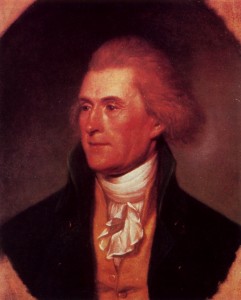Yesterday I pointed out false quotations attributed to Washington, Henry, and Madison with respect to their linkage to the Christian faith. Now, that doesn’t mean they weren’t Christians. My only purpose in highlighting those false quotes was to caution us to be careful, and to be sure we are accurate when we show how America was founded on Biblical principles.
 I have another example today of how well-meaning Christians can convey a false impression—well, actually it borders on an outright lie. This one relates to Thomas Jefferson. In a letter to Benjamin Rush, another signer of the Declaration of Independence, written in 1803 during Jefferson’s presidency, Jefferson explained his religious views. Some Christians have referenced this letter to “prove” that our third president was in fact a Christian. Let me give you the first part of that letter, make a few comments, then provide the rest of the letter, which clarifies his language.
I have another example today of how well-meaning Christians can convey a false impression—well, actually it borders on an outright lie. This one relates to Thomas Jefferson. In a letter to Benjamin Rush, another signer of the Declaration of Independence, written in 1803 during Jefferson’s presidency, Jefferson explained his religious views. Some Christians have referenced this letter to “prove” that our third president was in fact a Christian. Let me give you the first part of that letter, make a few comments, then provide the rest of the letter, which clarifies his language.
Jefferson wrote to Rush about conversations they had carried on earlier in life:
The Christian religion was sometimes our topic; and I then promised you that one day or other I would give you my views of it. They are the result of a life of inquiry and reflection, and very different from that anti-Christian system imputed to me by those who know nothing of my opinions. To the corruptions of Christianity I am indeed opposed, but not to the genuine precepts of Jesus himself. I am a Christian.
Now, that sounds pretty good to the untrained ear. But notice this: he says he is opposed to the “corruptions of Christianity.” What is meant by that? Jefferson thought that later generations added to the gospel accounts by inserting stories of miracles and the resurrection of Jesus. He liked the “genuine precepts of Jesus,” the moral teachings, but he rejected the essence of the gospel message of the atonement and resurrection.
But doesn’t he say “I am a Christian”? Shouldn’t that be taken at face value? Well, throughout history, and today also, you will find a lot of people claiming identification with Christ who were by no stretch of the imagination real Christians. We can’t simply take Jefferson’s declaration and not investigate further. In fact, all we have to do is finish the paragraph in the letter.
You see, his sentence was incomplete in the quote above. Let me give you the rest of it:
I am a Christian, in the only sense in which he wished anyone to be: sincerely attached to his doctrines in preference to all others, ascribing to himself every human excellence, and believing he never claimed any other.
In other words, Jesus never claimed to be anything but a human being. He never claimed to be divinity. He was just a man.
If that’s one’s view of Jesus, stripped of the very nature of God, one doesn’t believe the gospel message, and doesn’t consider Jesus to be the Savior. Jesus’ divinity is so crucial to the entire fabric of the Christian faith, that denial of it is to deny the faith itself. Jefferson was not a Christian. He respected the moral teachings of Jesus, but rejected the main message.
One Christian group that strives to showcase the Biblical origins of America put out a newsletter that used Jefferson’s letter to Rush to prove the Christian faith of this founder. What the group did, though, was inexcusable. It stopped the excerpt from the letter with the phrase “I am a Christian,” thereby omitting the rest of the sentence and the fuller explanation of how Jefferson defined the term “Christian.” No one who names the name of Christ should ever promote this kind of fraud on the public. It demeans the faith and makes the job much harder for those of us who know the truth of America’s Biblical foundations, but who seek to lay out the case on solid grounds.
To mislead in this way is the same as outright lying. As I said already, it is inexcusable. I urge all who read this to be forthright and honest in these matters. That’s God’s way.
